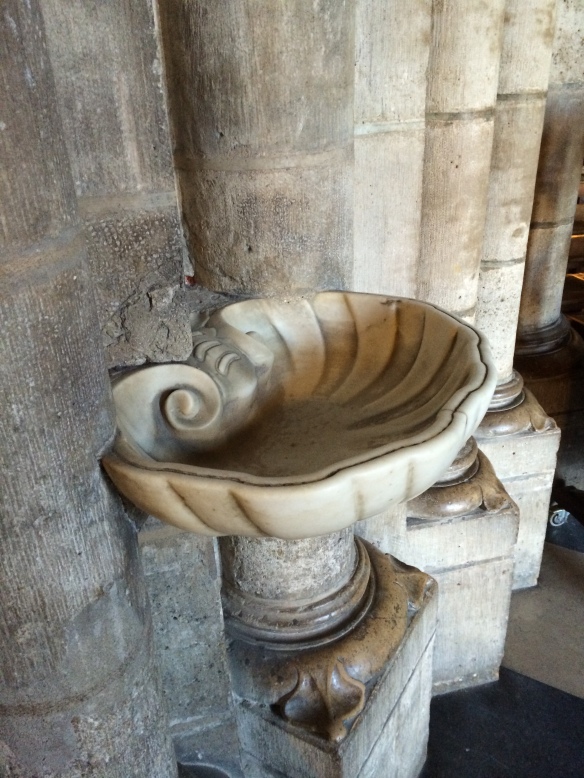What a strange word “helper” is; a friend of mine from an earlier generation raised in the south hears the description of the domestic help that had a hand in raising her (hence the title). I think of being five or six years old and spending time in the kitchen with my mom, or my grandmother.
Though “Advocate” is a more common translation these days, the Bible I most often preach from uses “Helper” to describe the gift of the Holy Spirit (in John 15:26ff). Indeed, that strange word jarred me out of comfortable, abstract contemplation of what having a spiritual “advocate” might mean, plunging me into specific memories (of mine, and of others). In “Helper,” I heard an echo of Genesis, when God and Adam are looking for a suitable “helpmeet” or “helper” for man. God, the Holy Spirit, as my own “helper,” my own suitable companion; when the Holy Spirit comes at Pentecost, some call it the birth of the church, but perhaps it could also be thought of as the arrival of our constant comrade (Matthew 28:20).
At the very beginning of Genesis (1:2), the Spirit of God hovers over the face of the waters; it’s no coincidence that water is the tangible, physical sign used in Baptism–as the Holy Spirit enters each one who is doused. The Holy Spirit becomes our Helper, our friend, at that moment. What signals an imminent birth but a rush of waters? Water sprinkled on us (or dipped on our fingers as we enter or leave a church door) begs us to remember that we’ve been cleansed from sin and given new life, that the Holy Spirit hovers over, in, and around us always.
There’s another way the Holy Spirit is often described in Scripture, too, not only with water, but also with breath, ru’ah in Hebrew, and pneuma in Greek. In the Nicene creed, which we recite together each Sunday, we proclaim God the Holy Spirit as the “giver of life;” indeed, both of those words refer to breath’s animating force. What’s the first thing that happens when a baby is born, but she cries–taking in her first breath? Before machine monitors, how could we tell if someone was still alive but by seeing or hearing if he was still breathing? There’s a significance in hearing, in listening to another’s breath.
New mothers have told me that they’ll wake up in the middle of the night and strain to listen for their infant’s inhale and exhale; sitting next to someone in a pew or on a bus, or walking with someone, if we’re not speaking, we can hear their breath. It’s in the quiet that we are able to notice breath–even our own. What if it’s in quiet companionship (maybe even prayer?) that we’re able to hear God speak to us?
A few weeks ago, the mother of a chorister wrote a piece for the Columbia Star about the transformative power of choirs (specifically Trinity Cathedral’s), “Music Synchronizes Heartbeats.” In it, she cites a study which found that when singing together, a group of people come to have the same heartbeat rhythm. As people breath and sing together, their hearts beat together–as if they are one heart, not myriad.
As Pentecost (the coming of the Holy Spirit 50 days after Easter) was celebrated earlier this week, it’s time to consider how each of us is listening to the Holy Spirit. In baptism, the Holy Spirit entered our bodies, giving us new life and new breath. In worship, we are called to unify with the rest of Christ’s body, the church, timing our breath and hearts to beat together as one with Jesus at our head.
How are you listening for God today? How are you seeking to have your heart aligned with your brothers and sisters in Christ?



Speaks to me. Water and breath bring it down to the basics. The holy spirit, the comforter, our constant companion..excellent.
LikeLike